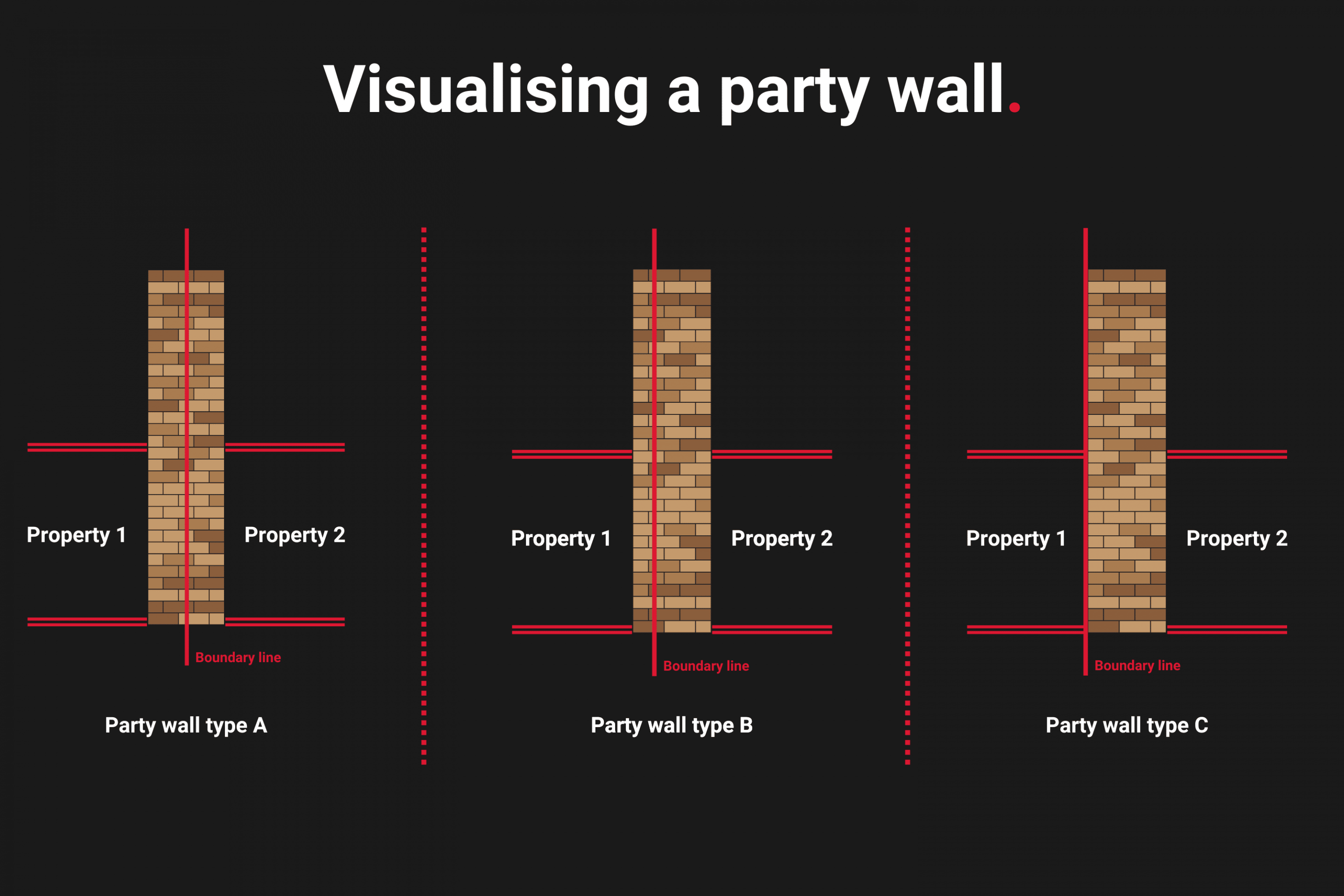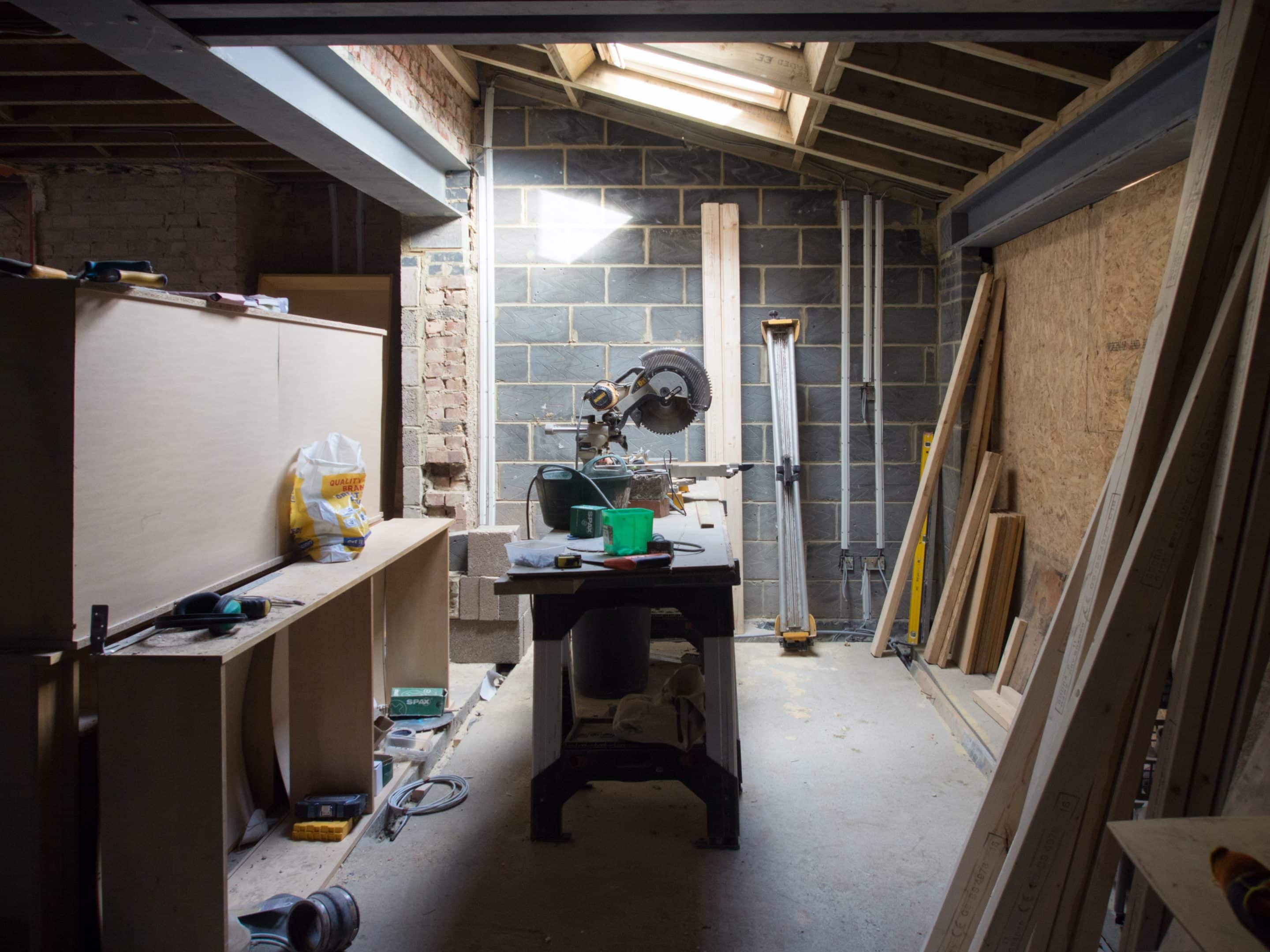Party wall disputes are among the most frustrating and confusing of issues for home and land owners. The law in this area can be unclear and complex and it’s easy to feel overwhelmed with something that may appear simple. This guide should help you understand the basics of party walls.
If you’re looking for a solicitor to help you resolve a dispute or require advice, contact our team via 0203 007 5500, or [email protected].
What is a party wall?
 A party wall is a wall that stands astride the boundary of land belonging to two or more owners. The wall forms part of each building and acts to separate and provide foundational support to the properties.
A party wall is a wall that stands astride the boundary of land belonging to two or more owners. The wall forms part of each building and acts to separate and provide foundational support to the properties.
If you are struggling with a boundary dispute with a neighbour, you can find more information on our boundary disputes blog.
A party wall can exist independently from a building, for example a masonry wall separating two gardens. It’s important to note that fences and hedges are not regarded as party walls or structures.
Furthermore, in flats, residents will share ceilings, floors, and other partitions such as stairways with other residents. These are also party structures.
Ideally, the wall will sit along the property boundary so that half of the wall’s thickness lies on each property. However, this is not always the case and occasionally the entire wall will be upon one property.
How is party wall ownership determined?
The party wall will legally belong to one person, however who is responsible for the party wall may be different and dictated by title deeds or a party wall agreement. In any case, any tenant looking to make changes to a party wall must inform other homeowners of planned building works.

Party Wall Act 1996.
Due to the nature of party walls occupying two or more people’s properties, they can often become sources of dispute. For example, over maintenance costs or building works.
The Party Wall etc. Act 1996 intends to prevent potential disputes and provides a legal framework for conducting works and resolving disputes.
This includes a framework for dividing ownership in the event of works taking place:
Building owner
- This refers to the person who owns the building or land where works are to be undertaken
Adjoining owner
- This refers to the person who owns the buildings (or land) adjoining to the building or land where works are to be undertaken. This covers not just the owner but also any potentially affected tenants occupying the property.
What is a party wall agreement?
 If you plan on carrying out any building work near, or on a party wall you must tell your neighbours, provide them with a party wall notice and produce a party wall agreement in writing.
If you plan on carrying out any building work near, or on a party wall you must tell your neighbours, provide them with a party wall notice and produce a party wall agreement in writing.
The agreement sets out a variety of information, for example:
- A schedule of condition
- Drawings and details of the works
- Neighbour’s survey fees
- Insurance details
- Time limits and working hours
The agreement also acts as evidence of consent between both parties.
What is a Party Wall notice?
The notice outlines the intended works and must be served to a neighbour 2-12 months before works are to commence.
What works require a party wall agreement?
- Any work to party walls between semi-detached or terraced houses
- Work to any party walls or structures between flats
- Excavations or loft conversions that involve work to, or close to, the party wall
- Storey extensions
- Increasing the thickness or height of party walls
- Damp proofing
- New walls adjoining to the party wall
Minor works, such as re-plastering, redecorating, or fitting kitchen/shelving units do not require a party wall agreement.
Can a neighbour refuse to consent to proposed works?
 Once you have notified your neighbour(s) of planned works, they have 14 days to respond to the plans. A neighbour cannot prevent works taking place that are within the law but they may provide a counter-notice asking for changes to the works outlined, requests over the timeframe or working hours, or additional works. If a neighbour requests additional works, it is likely they will have to agree to a share of the costs.
Once you have notified your neighbour(s) of planned works, they have 14 days to respond to the plans. A neighbour cannot prevent works taking place that are within the law but they may provide a counter-notice asking for changes to the works outlined, requests over the timeframe or working hours, or additional works. If a neighbour requests additional works, it is likely they will have to agree to a share of the costs.
It’s important to note that if 14 days pass and there is no response from the neighbour, this constitutes ‘deemed refusal’. This means the neighbour automatically refuses consent to any works, even if they do not specify this.
If the two parties cannot reach an agreement (or the neighbour does not respond), they must appoint a surveyor to settle the issue.
What does a party wall surveyor do? The surveyor(s) will prepare an ‘award’. This sets out the details of any proposed work. This will also record the condition of the neighbours’ side prior to works taking place, so any damage can be properly recorded and made good following the conclusion of works. This is a schedule of condition.
The surveyor(s) will prepare an ‘award’. This sets out the details of any proposed work. This will also record the condition of the neighbours’ side prior to works taking place, so any damage can be properly recorded and made good following the conclusion of works. This is a schedule of condition.
Surveyors will also have access to the property for the duration of the works so they can continue inspections.
Any person can be appointed as a surveyor, although its beneficial for the surveyor to be either a qualified professional or have extensive knowledge. Both parties must agree upon the surveyor.
Following the conclusion of works, both parties will have a further 14 days to dispute the award if they wish.
Who pays the surveyor and how much does obtaining a party wall agreement cost?
Generally, the building owner will pay the surveyor’s fees for drawing up the award and any subsequent inspections. If a neighbour wishes to appoint their own surveyor, you will also have to cover their fees.
In total, obtaining a party wall agreement will normally range from a few hundred to a few thousand pounds, or in some cases even more. This includes the cost of the surveyor and any planning costs.
It’s important to note that an award cannot be granted retrospectively. If works go ahead without an award or an agreement, the consequences could be severe.
Common scenarios.
1. My neighbour and I are on good terms and they said we can go ahead, do we need an agreement in writing?
It’s really important to avoid the temptation of an ‘over the fence’ agreement. Even if you feel you and your neighbour have an excellent relationship, things may happen during the building process that are out of your control or entirely unexpected. This could not only strain your personal relationship with the neighbour but also have potentially severe financial consequences.
In all scenarios, it is advisable to keep written records, in some cases these may be potentially used in court.
2. My neighbour consented to the notice, what next?
If your neighbour has consented to the works, signed the agreement, and a surveyor has completed a schedule of condition, you’re free to proceed. It’s important to keep records of the agreement and document the works as they progress.
3. My neighbour rejected the notice…
If your neighbour has rejected the notice but has not returned a counter-notice OR you are unhappy with the revisions, the appointment of surveyors is necessary to settle the matter.
4. My neighbour did not respond to the notice…
If your neighbour has failed to respond to the notice, you must assume they do not consent to any works and proceed accordingly. Therefore, the appointment of surveyors is necessary.
In some cases, you may need to appoint and pay for a surveyor on behalf of the neighbour.











Leave a comment Your email address will not be published.